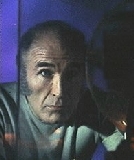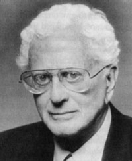 Barry Morse,
Barry Morse,  David Janssen,
David Janssen,
after portraying Dr. Richard Kimble, went on to appear in numerous
other TV shows and films until his death of a heart attack on
February 13, 1980, at age 49. While he reportedly earned $4.5 million a
year for The Fugitive, it would be fair to say that none of his
later projects was more than moderately successful, and a few were, to
be honest, pretty abysmal. His first movie after The Fugitive,
Warning Shot, is definitely one of his better ones,
though — an adaptation of a book about an eccentric cop who is
falsely accused of murder. Janssen, looking almost exactly like he
does in the last season of the TV show, plays the familiar role of the
framed man, and a galaxy of Hollywood luminaries are constantly
showing up for little cameos, making the whole movie seem on one level
like a big congratulatory celebrity party for the star of the TV show
that just went off the air in a blaze of glory. Janssen had two other
TV series in the '70s, O'Hara, U.S. Treasury (1971) and
Harry O (1974), and appeared in at least one movie with a
former Fugitive guest star, namely, the TV tearjerker A
Sensitive, Passionate Man co-starring Angie
Dickinson. Janssen plays a self-destructive alcoholic, a
role which seems vaguely autobiographical.
The Internet Movie Database also
lists him as appearing in the TV movies City in Fear, High
Ice, The Golden Gate Murders, S.O.S. Titanic,
Centennial, The Word, Superdome, Nowhere to
Run, Mayday at 40,000 Feet!, Stalk the Wild Child,
Fer-de-Lance, Moon of the Wolf and The Longest
Night, as well as in a few big-screen productions such as Two
Minute Warning (1976), Once Is Not Enough (1975), Macho
Callahan (1970), Generation (1969), Marooned (1969),
The Green Berets (1968), and The Shoes of the Fisherman
(1968). Before The Fugitive, Janssen starred in an earlier TV series,
Richard
Diamond, Private Detective, in the '50s, and
gave a memorable performance as the Jewish gangster protagonist of
King of the Roaring Twenties (1961). He also was in the sequel to
Bedtime for Bonzo in 1952, but did not have any scenes with
Ronald Reagan since the Gipper only appeared in
the original. Janssen, born David Harold Meyer on March 27, 1930, in
Nebraska, also has a few credits as a child actor.
 Barry Morse,
Barry Morse,
after playing Lieutenant Philip Gerard, gave another memorable
performance as Professor Victor Bergman on the subsequent TV show
Space
1999. Actually the role is not so different from the one he
played on The Fugitive, since his Gerard also has a bookish,
intellectual quality, pursuing Kimble rather like a dour schoolmaster
who wants to take a truant pupil to task. Tommy Lee Jones, portraying
Gerard in the 1993 movie, uses an entirely
different approach; his Gerard is a drawling, wise-cracking regular
guy. In an ironic twist, Barry Morse was given a cameo in this film,
but his footage was consigned to the out-take reel by director Andrew
Davis. In his brief scene, Barry appeared as a retired cop who catches
sight of Kimble on a busy Chicago street. Recognizing the fugitive, he
starts to chase after him, dodging the busy traffic, much like Kevin
McCarthy in the remake of Invasion of the Body Snatchers. But,
fortunately for Kimble (and unfortunately for Barry's character), he
is hit by a bus before he can collar his
man. The Internet Movie
Database also lists him in Memory Run (1996),
TekWar (1994), Glory! Glory! (1989), Fight for
Life (1987), Hoover vs. the Kennedys: The Second Civil War
(1987), The Return of Sherlock Holmes (1987), Covenant
(1985), The Innocents Abroad (1983), Sadat (1983),
The Changeling (1980), Klondike Fever (1980), A Tale
of Two Cities (1980), The Shape of Things to Come (1979),
The Golden Bowl (1972), Asylum (1972), The Telephone
Book (1971), Puzzle of a Downfall Child (1970), and
Justine (1969). He was also in the TV miniseries Master of
the Game (1984), A Woman of Substance (1983), and The
Martian Chronicles (1980), and had a part on the short-lived TV
show The Adventurer in 1972. Two of his more memorable roles
were as a raving Nazi general in the TV miniseries adapted from Herman
Wouk's World War II novels, and in Whoops Apocalypse (1986) as
``President Johnny Cyclops''. Prior to The Fugitive, only
four credits for Barry are listed — in the movies Kings of the
Sun (1963), No Trace (1950), and The Goose Steps Out
(1942), and in a 1962 episode of The Twilight Zone. For more, officially
sanctioned details about Barry's career, visit
The Barry Morse
Homepage.
Bill Raisch, despite the undeniable star quality he displayed
as one-armed man Fred Johnson in such episodes as
A CLEAN AND QUIET
TOWN and THE IVY
MAZE, did not have a very stellar career after his moment in
the Fugitive limelight. No post-1967 credits for Raisch can be
found, though he appeared in at least two movies before the TV show:
Berlin Express in 1948, and Lonely Are the Brave (1962)
— as ``One Arm'', strangely enough. (In that movie he in fact has a
big fight scene with Kirk Douglas, showing off some of the same
tactics he later will employ in his dealings with members of the
Kimble family.) However, Raisch was honored by the entertainment
community at the 1967 Emmy Awards, where he was presented with a
Special Achievement Emmy by no-armed man Harold Russell (The Best
Years of Our Lives).
 Roy Huggins,
Roy Huggins,
creator of The Fugitive, also gave birth to the great '70s
TV series The
Rockford Files. But his output has been uneven to say the least —
Huggins is responsible for the mindlessly banal Hunter as well,
a show whose gung-ho cop heros, played by Fred Dryer and Stepfanie
Kramer, are always roughing up punks Dirty Harry-style, and
would surely not have scrupled to strap Richard Kimble into
the chair post haste if they had had
jurisdiction in his case. In The
Internet Movie Database, Huggins is also listed as having
worked on the original
Beverly
Hillbillies TV show. He produced four
post-Fugitive TV movies: The Jordan Chance (1978),
The November Plan (1976), The Challengers (1968), and
The Young Country (1970) (which he also wrote and directed).
Before The Fugitive, he wrote such movies as Pushover
(1954), Three Hours to Kill (1954), Gun Fury (1953),
Sealed Cargo (1951), The Lady Gambles (1949), Woman
in Hiding (1949), and I Love Trouble (1948), wrote and
produced the movie A Fever in the Blood (1961), and wrote and
directed Hangman's Knot (1952). According to Huggins, in an
interview for the book
The
Fugitive Recaptured, ``Everyone I consulted about
The Fugitive hated the idea — they found it offensive and
distasteful. One man called it `a slap in the face of American
justice.' But the American people never saw a thing wrong with it.''
Roy Huggins passed away on April 3, 2002 at the age of 87.
... And the rest: Many Fugitive veterans went on to
bigger things after their guest-star appearances on the show. Bruce
Dern, whose brief appearances in disturbed psycho-type roles added
extra luster to such episodes as
COME WATCH ME
DIE and CORNER OF
HELL, went on to play even bigger psycho roles in such movies
as Silent Running and Black Sunday. Telly Savalas, who
appeared in several Fugitive episodes, including
WHERE THE ACTION
IS and MAY
GOD HAVE MERCY, of course later moved on to way bigger fame as
the indefatigible vampire hunter on the TV series Kojak. And
Beau Bridges, who consistently played the sicko family scion (for
example, in STROKE OF
GENIUS and THE OTHER
SIDE OF THE COIN), graduated to shockingly bigger pants sizes
in his later career, when he blew up like a blimp. Other
Fugitive friends who show up elsewhere in the modern cultural
mosaic include Donald
Pleasence (``The
Man with the Hypnotic Eye''), Elisha
(Maltese Falcon) Cook, Mickey
Rooney, Claude
(``Double-A M-C-O'') Akins, Suzanne
(Bob Newhart Show) Pleshette, Ivan
(Hogan's Heroes) Dixon, Greg (Mission
Impossible) Morris, J. D.
(McCloud) Cannon, along with Kurt Russell,
Ron Howard, Melvyn Douglas,
Brian Keith, Robert Duvall,
Charles Bronson, Ed Asner,
Leslie Nielsen, and
William Shatner.
 Back to HOMEPAGE OF THE HUNTED <http://unchance.net/Fugitive>
Back to HOMEPAGE OF THE HUNTED <http://unchance.net/Fugitive>